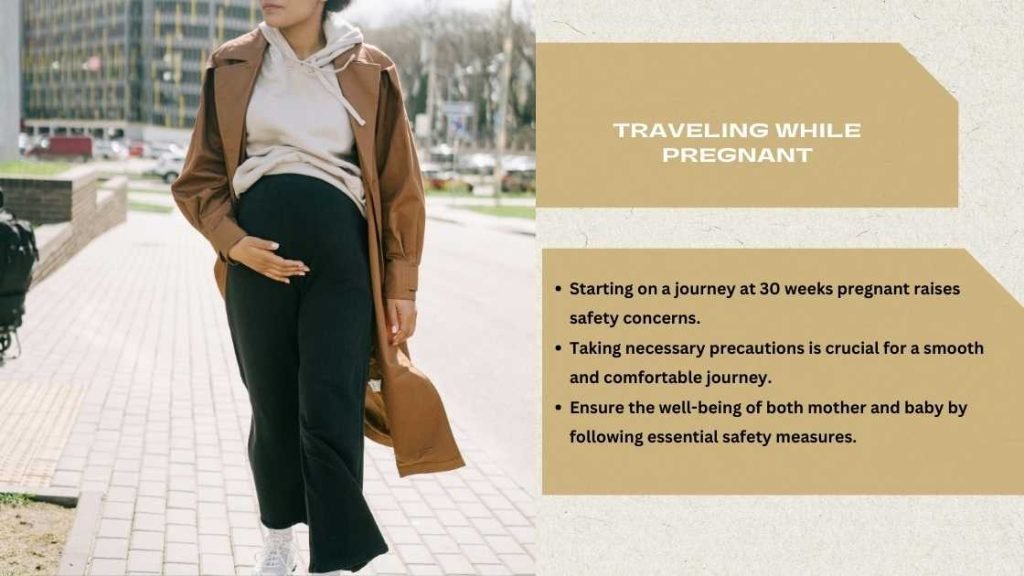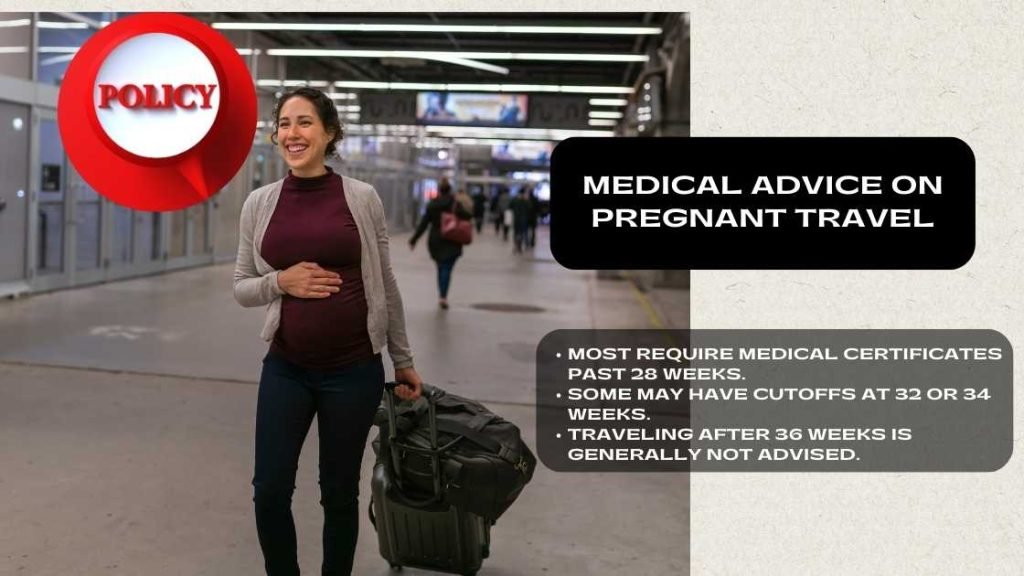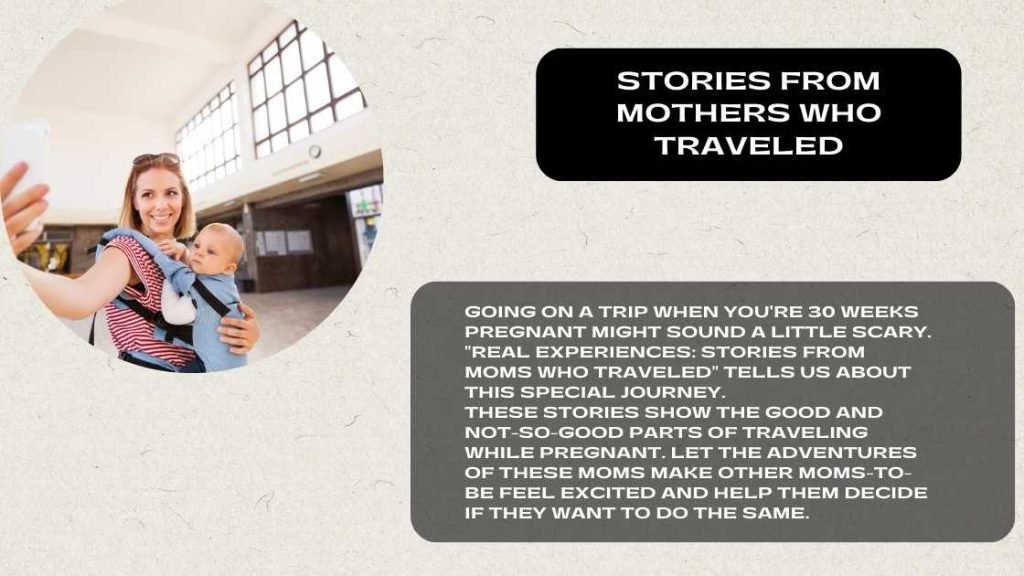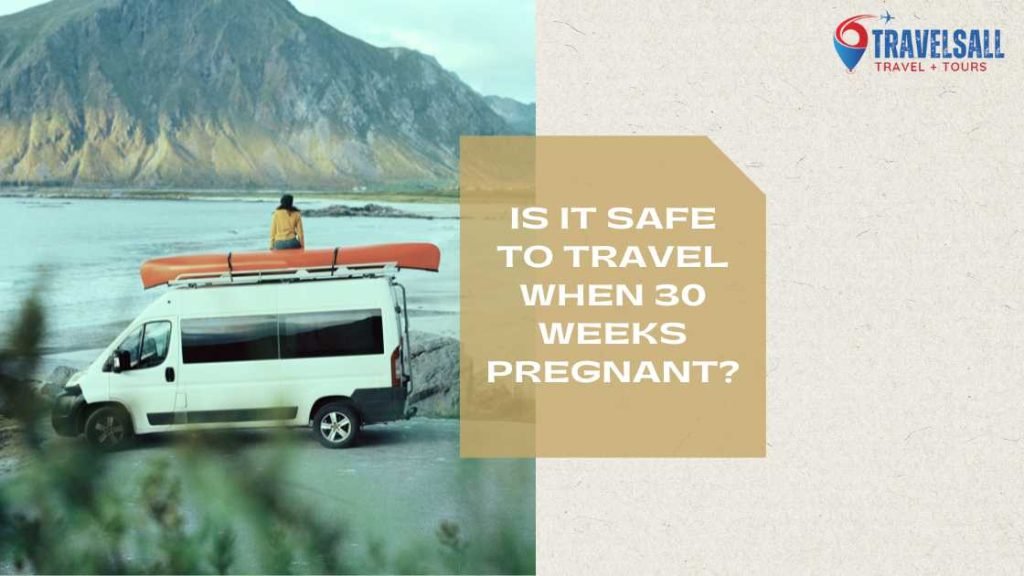Traveling at 30 weeks pregnant can be safe with medical clearance and careful planning. Consult your healthcare provider before making travel arrangements.
Going on a trip when you’re almost having a baby, like when you’re about 30 weeks pregnant, needs more planning. If you’re pregnant and traveling, it’s important to be comfy and safe.
You should know where to find doctors and have numbers for emergencies. Most airlines let pregnant ladies fly until they’re about 36 weeks pregnant, but it’s smart to check the rules of the airline you’re using.
Is It Safe to Travel When 30 Weeks Pregnant?” It’s essential to prioritize your comfort by wearing comfy clothes, staying hydrated with lots of water, and taking regular breaks to prevent blood clots.
Don’t overlook the importance of bringing necessary baby papers and having a well-thought-out plan for accessing medical care if needed. Being mindful and informed about what to do during your journey can turn it into a happy and easy adventure during this stage of pregnancy.
Table of Contents
ToggleTraveling While Pregnant: Safety Precautions

Starting on a trip at 30 weeks pregnant can seem daunting. It sparks questions about safety for both mother and baby. Taking the right precautions ensures a smooth journey. Below are key safety measures for expectant mothers to consider.
Key Health Considerations Before Departure
Consult your doctor. Before planning any trip, a medical green light is crucial. A check-up confirms your fitness to travel. Listen to your body.
- Review your medical history. Past complications may influence travel safety.
- Prepare a health kit. Include prenatal vitamins, snacks, and water. Remember your medical records and a list of emergency contacts.
- Plan for comfort. Choose aisle seats for easy movement. Wear comfortable clothing and compression socks to aid circulation.
Guiding Through Travel Restrictions
Research airline policies. Many airlines restrict travel after 28 weeks. Secure a letter from your doctor. This letter should state your due date and that you’re fit to fly.
| Item | Description |
|---|---|
| Insurance | Check if your policy covers pregnancy and overseas childbirth. |
| Destinations | Avoid regions with limited medical facilities or travel advisories. |
| Mode of Travel | Long car rides need frequent breaks. Cruise lines have pregnancy cutoffs too. |
Keep airport security in mind. TSA scanners are safe but opt for a pat-down if you’re concerned. Stay hydrated and avoid lifting heavy luggage.
Safe travel at 30 weeks is possible with thoughtful planning. Follow these guidelines for a pleasant journey. Safe travels!
The 30-week Milestone
The 30-week Milestone marks a significant phase in pregnancy. During this time, the expectant mother’s body undergoes several changes. It is vital to assess the safety of travel at this stage.
Careful consideration is essential for the health of both the mother and the baby. Let’s explore the transformations at 30 weeks and the potential risks of late-term travel.
Changes In The Body At 30 Weeks
Around the 30-week mark, women experience profound physical shifts. The belly is prominently larger. This growth can cause discomfort, with symptoms like back pain becoming more common. The burgeoning bump also affects balance, making movements more deliberate.
- Expanded belly size – making space for the growing baby
- Frequent urination – as the baby presses on the bladder
- Shortness of breath – due to upward pressure on the diaphragm
- Swelling in feet and ankles – because of increased fluid retention
Potential Risks Associated With Late-term Travel
Traveling when 30 weeks pregnant can present risks. It’s essential to recognize these before making any travel plans. Consult with a healthcare provider first. Here are some risks linked to late-term travel:
| Travel Risk | Description |
|---|---|
| Preterm labor | Risk increases with long periods of sitting or limited access to medical care. |
| Deep vein thrombosis (DVT) | Long-distance travel can raise the chances of blood clots, especially in the legs. |
| Travel restrictions | Airlines have guidelines around late-term pregnancy; some may require a doctor’s note. |
| Medical care access | Access to quality healthcare is essential should any issues arise during travel. |
Plan and Prioritize Comfort. Opt for travel methods that allow for frequent stops. Stretch and move around to boost circulation. Drinking plenty of water is vital to stay hydrated.
Medical Advice On Pregnant Travel

Considering a trip at 30 weeks pregnant? Safety takes priority.
It’s vital to heed medical advice on pregnant travel. This section explores what experts say about travel during late pregnancy. Learn about the dos and don’ts directly from obstetricians and gynecologists.
Guidelines From Obstetricians And Gynecologists
Obstetricians and gynecologists set travel guidelines for pregnancy.
The main advice includes:
- Check-up Before Travel: Have an appointment before going.
- Cut-off Periods: Many advise against travel after 36 weeks.
- Assess Risk: Consider personal and pregnancy risks.
- Frequent Breaks: Take regular breaks during long trips.
- Proper Hydration: Stay well-hydrated and avoid dehydration.
- Carry Medical Records: Keep health information accessible.
- Know the Nearest Hospital: Find hospitals at your destination.
- Travel Insurance: Ensure it covers pregnancy complications.
Situations That Warrant Postponing Travel
Certain conditions suggest delaying trips. They include:
- Preeclampsia or high blood pressure.
- History of premature birth.
- Multiple pregnancies (twins, triplets).
- Any signs of labor.
- Placental issues.
- Unexplained vaginal bleeding.
- Severe anemia.
In these cases, stay close to your healthcare provider. Putting off travel becomes essential.
Choosing The Right Mode Of Transport
Traveling at 30 weeks pregnant requires careful planning. Expectant mothers often wonder about the safest mode of transport. Many factors come into play, including comfort, speed, and healthcare access. Each travel method has its pros and cons.
Here, we’ll explore the options to help decide the best choice for you and your baby.
Pros And Cons Of Flying
Flying can be swift and efficient. Most airlines allow pregnant women to fly up to 36 weeks. Here’s what to consider:
- Pros:
- Quick travel over long distances
- Generally comfortable seating
- Flight crew available for emergencies
- Cons:
- Potential for cabin pressure to cause discomfort
- Restricted movement for extended periods
- Security and boarding can be tiring
Evaluating The Safety Of Car, Train, And Sea Travel
Car, train, and sea travel offer more space to move. But they each have important factors to consider.
| Car | Train | Sea |
|---|---|---|
| Safe if breaks are frequent. Seat belts can be adjusted below the belly. Nearby hospitals matter. | Trains provide room to walk. They have restrooms readily available. Schedules may be less flexible than driving. | Cruise ships have medical facilities. They may not be equipped for childbirth. Seasickness could be a setback. |
|
|
|
Airline Policies For Pregnant Travelers

Heading out on a plane at 30 weeks pregnant might bring up some questions. Especially around airline policies for pregnant travelers. Each airline has its own rules. Pregnant travelers need to be aware of these before booking their flights.
Airline Restrictions
Airlines have specific policies regarding pregnant flyers. Some airlines allow travel up to 36 weeks. Others may require a doctor’s note. Certain airlines won’t allow travel after 28 weeks without medical clearance.
It’s key to check with the airline for exact details. Travel restrictions often differ based on whether the flight is domestic or international.
- Most require medical certificates past 28 weeks.
- Some may have cutoffs at 32 or 34 weeks.
- Traveling after 36 weeks is generally not advised.
Knowing these restrictions helps plan your trip safely.
Guiding Through Boarding And In-flight Considerations
Once you understand the restrictions, ensure a smooth journey. Preparing for boarding and the flight is essential.
Selecting the right seat can make all the difference. An aisle seat allows easier movement.
During the flight, keep hydration and circulation in mind. Drink water often and walk around when possible.
Wear loose clothing and comfortable shoes. Use a support belt if needed.
In-flight comfort items can help. Think about bringing a neck pillow or a blanket.
Being ready for the flight experience is essential for your peace of mind and health.
Essential Travel Insurance Considerations
Traveling at 30 weeks pregnant brings unique challenges. A key factor is choosing the right travel insurance.
Moms-to-be must understand what their policy covers. Essential travel insurance considerations ensure peace of mind.
Coverage Specifics For Expectant Mothers
Travel insurance for expectant mothers varies. Not all policies offer maternity coverage. Here are points to review:
- Cut-off period: Many insurers set a pregnancy week limit. Check this carefully.
- Medical coverage: Ensure pregnancy complications are included.
- Destination matters: Coverage might change based on where you travel.
- Airline policies: Some policies align with specific airline requirements.
- Pre-existing conditions: Declare pre-existing pregnancy conditions.
Moms should consider policies with comprehensive benefits. These might include:
- Hospital stays
- Labor and delivery costs, if applicable
- Newborn care, in premature birth cases
Always read the fine print. It can save you from unexpected costs.
The Importance Of Including Pregnancy-related Care
Travel insurance should never overlook pregnancy-related care. Here’s why:
- Routine check-ups: Travel might coincide with important medical appointments.
- Emergency care: Access to care during unexpected pregnancy-related emergencies is vital.
- Repatriation: If early return is needed, ensure your policy covers it.
- Extended coverage: Postponed return due to medical advice should not mean extra expense.
Checklist for pregnant travelers:
| Travel Insurance Feature | Checklist Item |
|---|---|
| Maternity Coverage | Confirm inclusion of maternity care and related emergencies. |
| Cancellation Policy | Investigate options for cancellations due to pregnancy. |
| Travel Assistance Services | Access to 24-hour assistance for travel and medical needs. |
Selecting robust travel insurance can transform your journey. It ensures safety and comfort for both mother and baby.
Staying Comfortable During The Journey
A comfortable trip is key at 30 weeks pregnant. Your well-being is essential for you and your baby. Here, find ways to maintain comfort and the essentials for your travel kit.
Tips For Maintaining Comfort
- Dress in layers for easy temperature control.
- Choose aisle seats for easy restroom access.
- Take regular walks to prevent swelling.
- Do gentle stretches to ease muscle tension.
- Use a neck pillow and back support for extra comfort.
- Stay hydrated, but avoid caffeine.
- Snack on healthy foods to maintain energy levels.
Must-have Items In Your Travel Kit
A well-packed travel kit is your comfort companion. Pack these essentials:
| Item | Purpose |
|---|---|
| Supportive footwear | Prevents swelling and discomfort |
| Compression socks | Improves circulation |
| Pregnancy pillow | Supports your bump and back |
| Water bottle | Keeps you hydrated |
| Healthy snacks | Sustains energy |
| Travel documents | Ensures smooth travel |
| Medical records | Important for emergencies |
Emergencies On The Go: Being Prepared
Expecting mothers often wonder about the safety of travel at 30 weeks pregnant. Preparing for emergencies is vital. It ensures a stress-free journey. Ready for anything, have peace of mind even when away from home.
Locating Medical Facilities En Route
Know the locations of hospitals and clinics while traveling. Use these simple steps for peace of mind:
- Use online maps to pinpoint medical facilities.
- Make note of the closest hospital to your destination.
- Carry out a list of facilities with maternity services.
- Inform your healthcare provider of your travel plans.
- Check your health insurance for coverage in other areas.
Creating An Action Plan For Unexpected Situations
An action plan is a must for swift responses. Here’s how to develop one:
- Identify local emergency numbers and save them.
- Share your itinerary with your family for easy contact.
- Pack a pregnancy emergency kit with essentials.
- Carry copies of your pre-natal records for doctors.
- Plan for rest stops to avoid fatigue and discomfort.
- Establish contact methods with your doctor.
Nutrition And Hydration While Traveling
Traveling at 30 weeks pregnant brings unique challenges. One vital aspect to consider is how you’ll manage your nutrition and hydration.
Eating well and drinking enough fluids is vital, especially when you’re on the move. Let’s dip into the best ways to keep you and your baby healthy and nourished during your travels.
Planning Meals And Snacks
A little planning goes a long way to keep you energized and satisfied. Start by packing a variety of wholesome snacks. Think about balance: combine proteins, carbohydrates, and fats for sustained energy. Here are some snack ideas:
- Fruit and nut bars – easy to pack and full of nutrients.
- Yogurt pouches – for a quick protein boost.
- Whole-grain crackers and cheese – a satisfying pair.
Pack meals if your journey is long. A simple sandwich with lean meats or a veggie wrap can be satisfying. Remember to keep perishable foods cool.
| Food Item | Protein | Carbs | Fats |
|---|---|---|---|
| Almonds | 6g | 6g | 14g |
| Apple slices | 0g | 25g | 0g |
Importance Of Staying Hydrated
Hydration is key for a healthy pregnancy. Aim for at least 8-10 glasses of water daily. Carry a reusable water bottle and refill it frequently. Avoid caffeine and sugary drinks. They can dehydrate you. Consider these hydrating choices:
- Water – the best choice for staying hydrated.
- Coconut water – a natural electrolyte source.
- Herbal teas – a warm, comforting option.
Remember, dehydration can cause contractions, so keep sipping! If you’re flying, the cabin air can be dry. Drink extra water to compensate.
Real Experiences: Stories From Mothers Who Traveled

Starting on a travel adventure at 30 weeks pregnant can seem daunting. “Real Experiences: Stories from Mothers Who Traveled” sheds light on this unique journey.
These tales reveal the highs and lows of traveling while expecting. Let their adventures inspire and guide expectant mothers pondering a similar path.
Positive Journeys During The Third Trimester
Countless mothers recall their travels with warmth and joy. Their stories often highlight the comfort they found in planning. They stress the importance of selecting destinations wisely.
Relaxing beach holidays and serene mountain retreats come highly recommended. Accommodation with easy access to medical facilities offers extra peace of mind. Mothers share their delight in global babymoon experiences. They praise the kindness of strangers and the bonds formed on their travels.
- Nurturing mother-baby bond in nature
- Enjoying cultures with new perspectives
- Finding inner strength and adaptability
Challenges Faced And Lessons Learned
Despite positive experiences, challenges do arise. Moms talk about packing essentials and Guiding travel insurance.
They discuss the importance of staying hydrated and moving frequently during long flights or drives. Personal stories reveal the adjustment to different climates and cuisines.
Unexpected hurdles, such as finding comfortable shoes or sourcing specific foods, are common.
Moms urge careful consideration of itinerary flexibility. Ensuring a balance between activity and rest is key. They recommend keeping healthcare providers informed and having a clear plan for emergency care.
Through these stories, mothers across the globe share valuable insights. This collective wisdom becomes a treasured guide for families starting on their travel adventures.
| Challenge | Lesson |
|---|---|
| Long flights | Move regularly; stay hydrated |
| Different climates | Adjust wardrobe accordingly |
| Travel Insurance | Ensure pregnancy coverage |
Frequently Asked Questions On Is It Safe To Travel When 30 Weeks Pregnant
Is It Safe To Travel At 30 Weeks Pregnant?
Traveling at 30 weeks pregnant is generally safe with the doctor’s approval and considering your health and pregnancy history. Opt for comfortable transportation and keep emergency contacts handy.
At What Point In Pregnancy Should You Stop Traveling?
Consult your healthcare provider before travel, but many suggest limiting travel after 36 weeks of pregnancy. Always prioritize safety and comfort when deciding.
Why Can’t You Travel After 32 Weeks?
Traveling after 32 weeks of pregnancy is often discouraged due to increased risks of premature labor and potential health complications. Airlines also impose restrictions for the safety of the expecting mother and her baby.
Is It Safe To Travel Long Distance In the Third Trimester?
Traveling long-distance in the third trimester can be safe with doctor approval, adequate planning, and frequent breaks. Always prioritize comfort and know the location of medical facilities along your route.
Conclusion
Starting on a journey at 30 weeks pregnant can be safe with proper planning. Consult your doctor and consider your comfort and health priorities. Opt for travel insurance and familiarize yourself with medical facilities at your destination. Ultimately, listen to your body and travel smartly for a pleasant experience.



